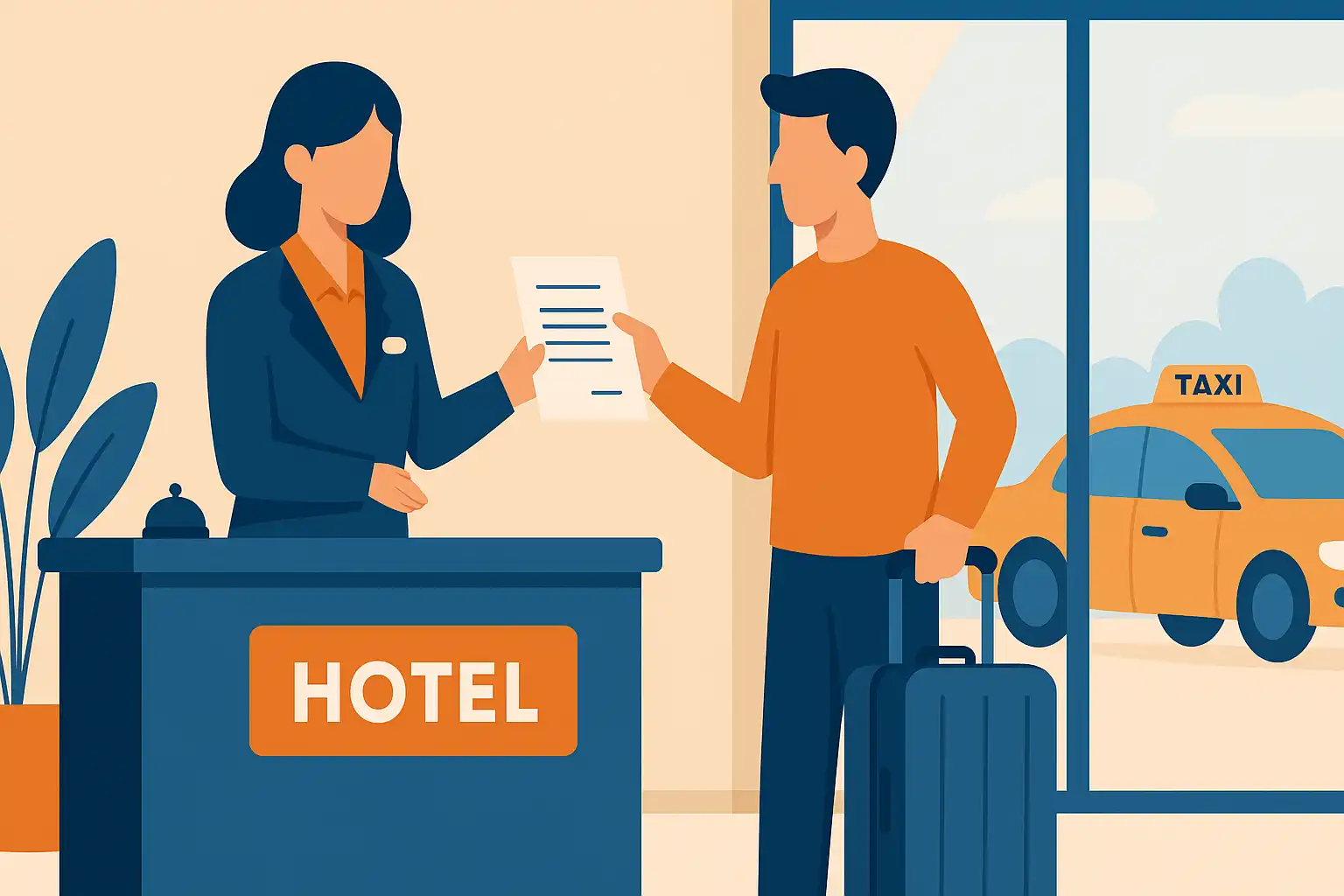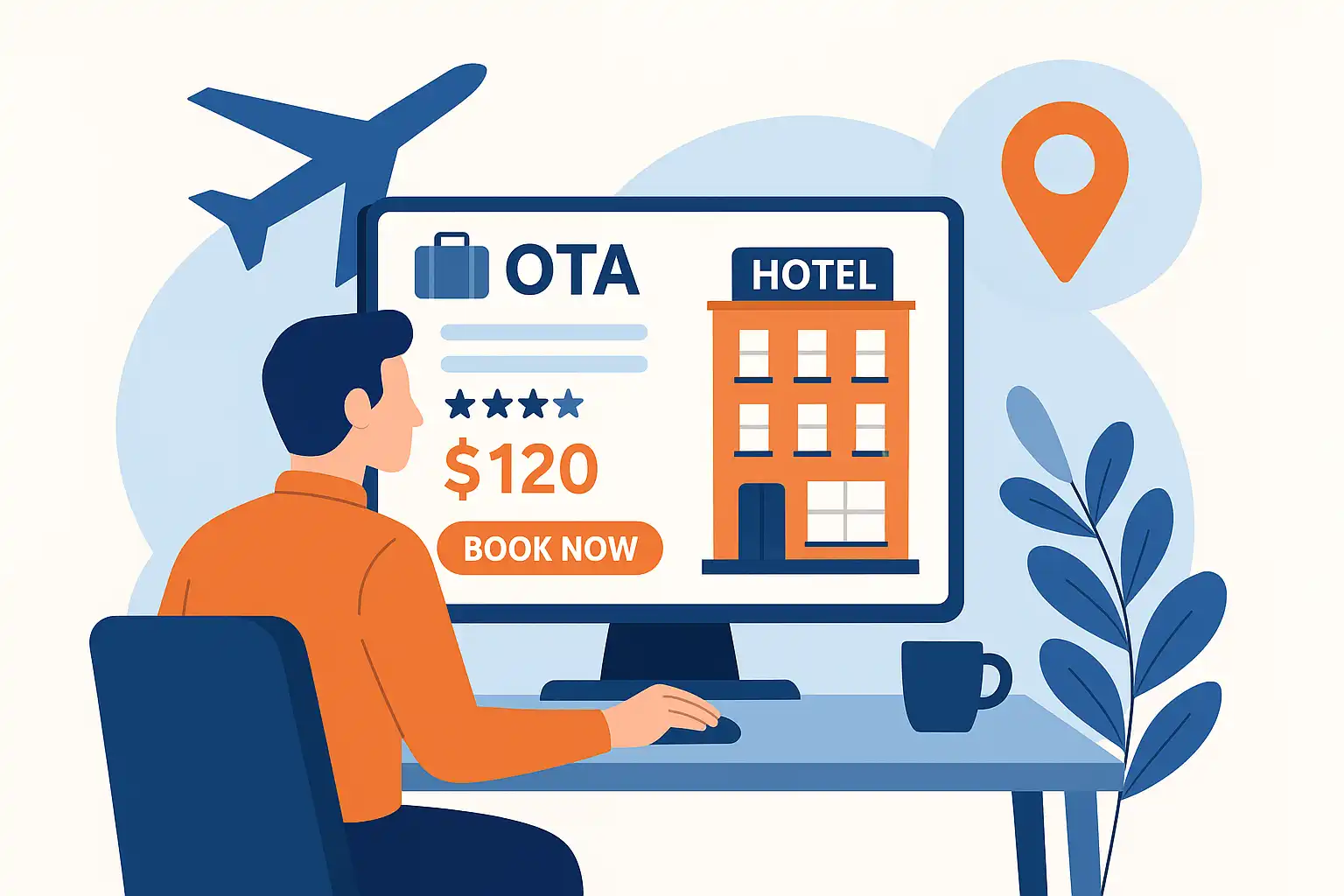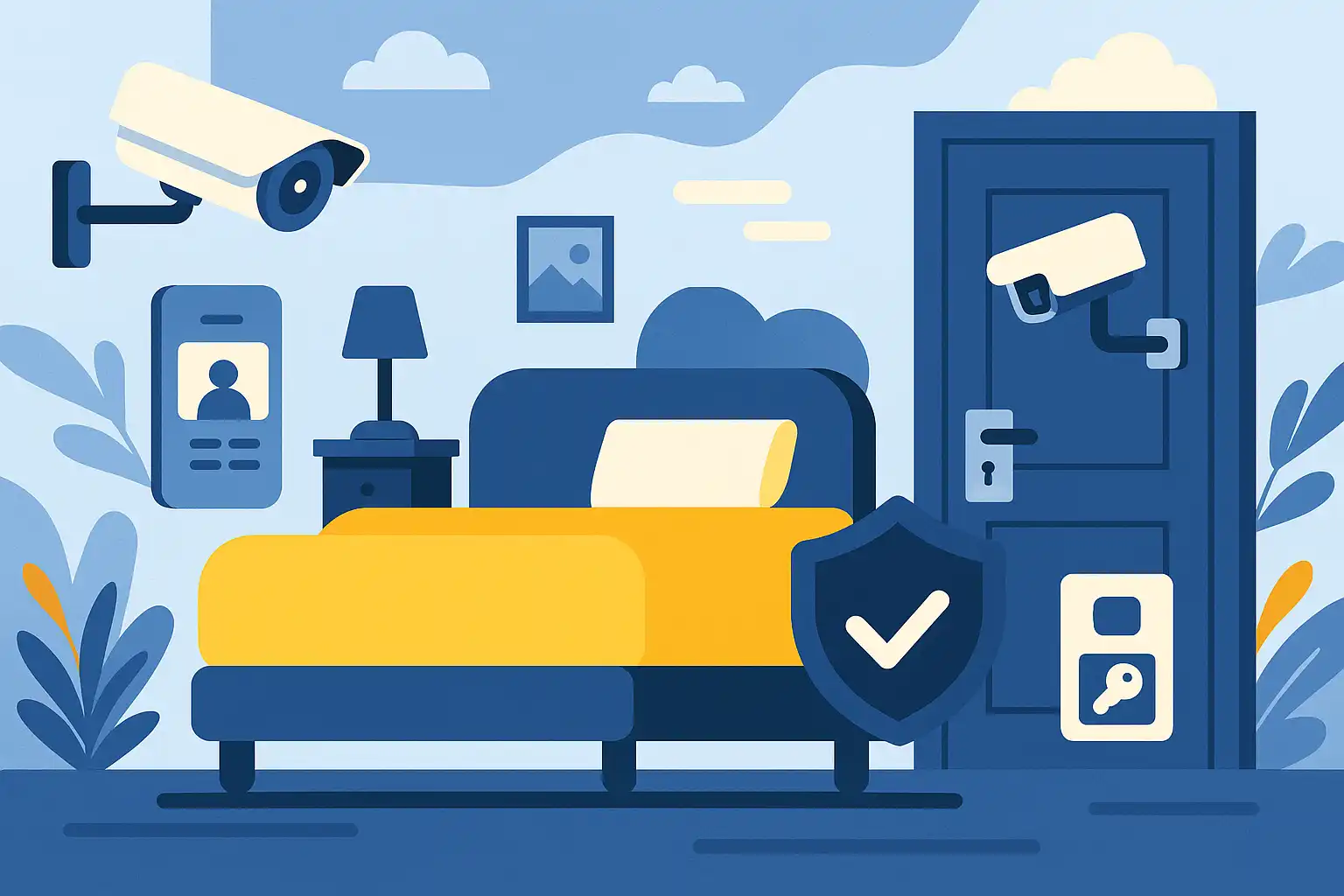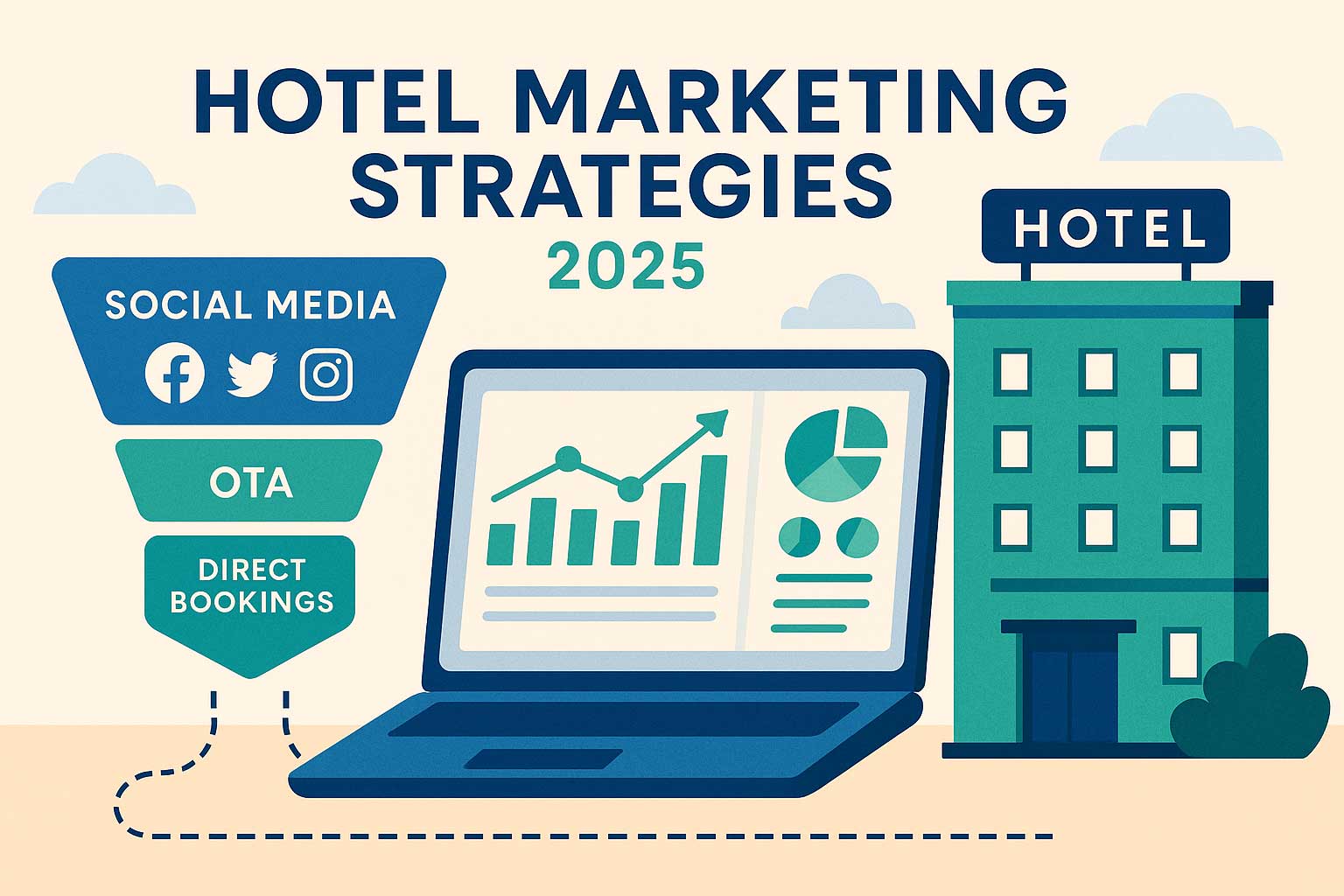Hotel CRM: 2025 Guide and 5 best hotel CRM Software
Jul 25, 2025
 Mika Takahashi
Mika TakahashiPopular Categories
Hotel Technology & InnovationHotel Operations OptimizationDigital MarketingIndustry TrendsRevenue ManagementHospitality Industry
Popular Categories
Trending Post

Hotel Walk Letter Template: Professional Guest Communication

Online Travel Agents: What They Are and How They Work

Hotel Security Systems: Modern Protection Solutions

Hotel Advertising: Complete Guide to Boost Bookings and Revenue

25 Hotel Marketing Strategy Ideas for 2025: Complete Guide

AI Reservation Agent: Revolutionizing Hotel Booking and Guest Experience

PMS Communication: Streamlining Property Management Through Effective Guest Messaging
Table of contents
The survival of hotels in today's competitive hospitality industry depends on delivering exceptional guest experiences. Hotel guests in the present day require individualized service and smooth communication and unique stay experiences that lead to repeat visits. Hotel crm systems serve as the essential tool which hotels use to transform guest information into valuable insights and customized guest experiences.
Hotel customer relationship management systems have progressed from basic contact databases into advanced platforms which connect with all hotel operational elements. The correct crm software will enhance guest satisfaction and increase direct bookings and optimize revenue streams for both boutique properties and multi-location hotels.
This detailed guide provides complete information about hotel crm platforms starting with fundamental system capabilities and ending with established best practices that generate quantifiable outcomes. Leading hotels use these systems to establish enduring guest connections while achieving long-term market growth in today's competitive environment.
What is a Hotel CRM?
Hotel CRM functions as specialized customer relationship management software which caters to the hospitality industry. Hotel crm software differs from standard retail and B2B crm systems because it provides solutions for managing guest interactions and preferences and experiences across various customer journey touchpoints.
Definition of Hotel CRM as Specialized Software
A hotel crm platform functions as a central system which gathers and organizes complete guest information from all interaction points starting from initial contact until post-stay follow-up. The platform collects data from all interaction points including online travel agencies (OTAs) and direct website bookings and front desk interactions and guest surveys and point-of-sale systems and marketing campaigns to build complete guest profiles which support individualized service delivery.
How Hotel CRM Differs from Generic CRM Systems
The main difference exists in the hospitality-specific features which generic CRM platforms lack. Hotel crms integrate seamlessly with hotel property management systems (PMS), central reservation systems, and specialized hospitality tools to create a unified ecosystem. The deep integration between hotel departments allows real-time data synchronization which provides complete guest information to all team members at their point of need.
Hotel crm systems handle hospitality business cycles through their management of seasonal patterns and group bookings and their ability to handle complex relationships between primary guests and their travel companions or corporate accounts.
Core Functions and Capabilities
Modern hotel crm platforms offer three key functions that are the building blocks of guest relationship management:
Guest Data Hub: Every interaction, preference and feedback is captured and stored in guest profiles. This includes contact details, booking history, room preferences, dietary requirements, special requests and communication logs across all channels.
Booking and Reservation Management: Seamless reservation handling with automatic sync across multiple platforms, special request tracking and integration with revenue management systems for dynamic pricing and inventory control.
Communication Tracking and Automation: Logging of all guest interactions – email, phone, SMS, social media and in-person conversations – so you can deliver consistent service and automated follow up sequences based on guest behaviour and preferences.
Integration Capabilities with Hotel Systems
Hotel crm software achieves its power through its capability to link with existing hotel technology systems. The leading platforms enable real-time connections to property management systems which provide immediate access to stay history and current reservations and point-of-sale integration for complete spending analysis and booking engine synchronization for direct booking experiences.
The integrated system removes data silos and manual data entry while maintaining guest information as current and actionable throughout all departments and touchpoints.
Why Hotels Need CRM Software
Hotels face unmatched difficulties in their current hospitality environment when it comes to guest relationship management. Hotels need to manage extensive guest data across various communication channels including websites and social media and OTAs and mobile apps and traditional phone calls to provide consistent personalized experiences that build customer loyalty and increase revenue.
Managing High Volumes of Guest Interactions
Hotels today handle hundreds to thousands of guest interactions through multiple touchpoints during each day. A centralized system failure causes important guest preferences and feedback to disappear which results in lost opportunities for personalized service and recovery of service issues. Hotel crm systems collect all guest interactions into one searchable database which allows staff to find relevant guest information for appropriate responses.
The system becomes essential during peak periods because hotels reach full capacity while experiencing high employee turnover rates. A complete crm database maintains consistent guest relationships even when different team members interact with guests.
Personalizing Guest Experiences in a Competitive Market
The hospitality industry has experienced a complete transformation in what guests expect from their stays. Hotels need to remember guest preferences and predict their requirements to provide customized premium experiences that justify higher prices. Hotels that implement effective crm software achieve guest satisfaction improvements between 15-25% which leads to better review scores and more repeat bookings.
Hotels achieve personalization through customized marketing offers and targeted amenities and proactive service touches which create a valued and understood experience for guests throughout their stay.
Building Long-Term Customer Loyalty
The cost of acquiring new customers exceeds the cost of keeping existing customers so businesses must prioritize customer loyalty as their main priority. Hotel crm platforms help build lasting guest relationships through their ability to monitor guest lifetime value and detect loyalty patterns and execute automated recognition systems for repeat visitors.
Hotels with strong loyalty programs achieve direct booking rates of 30% which decreases their need for costly OTA channels while establishing direct connections with their most valuable guests.
Maximizing Revenue Through Data-Driven Marketing
Hotels need to understand their most valuable guests and develop strategies to bring in similar customers for revenue optimization. Hotel crms deliver comprehensive analytics about guest spending habits and booking behaviors and marketing campaign response rates which allows hotels to direct their marketing toward their most profitable segments and opportunities.
Improve Guest Engagement
The process of guest engagement starts before arrival and extends through the entire period after guests leave. Hotel crm systems enable this extended relationship by creating comprehensive guest profiles that inform every interaction and touchpoint throughout the guest lifecycle.
Creating Detailed Guest Profiles
The modern guest profile contains more than basic contact details because it includes extensive behavioral and preference information. The detailed guest profiles track room preferences and arrival times and departure times and dining restrictions and preferences and spa and amenity usage and spending patterns across different property areas and communication preferences for marketing and service delivery.
Hotel CRM platforms that operate effectively update these profiles through each guest interaction to build a more detailed understanding of guest preferences and behaviors which supports advanced personalization methods over time.
Personalizing Marketing Campaigns
The use of data-driven personalization enables businesses to create targeted communications which connect with particular guest segments instead of sending generic marketing messages. Hotels that implement segmented email campaigns achieve open rates between 30-40% which exceeds the typical open rates of mass communications in the industry.
Hotels achieve success through personalization strategies which include seasonal promotions based on historical booking patterns and package offers that match past service usage and special occasion recognition using guest profile information and location-specific recommendations for return visitors.
Tailoring Room Assignments and Services
The guest experience starts when reservations are made and hotel crm data allows for proactive service customization. Front desk staff can use guest profiles to assign rooms that match documented preferences, coordinate with housekeeping to pre-arrange preferred amenities, alert food and beverage teams about dietary restrictions or favorite menu items, and schedule special services for anniversaries or celebrations noted in guest profiles.
Tracking Guest Interactions Across Multiple Channels
Hotel guests use multiple communication methods which include email and phone as well as social media and mobile apps and direct face-to-face contact. Hotel crm systems unify all communication touchpoints into one history which enables staff to access previous interactions and maintain consistent service across all communication methods.
The omnichannel approach eliminates the annoying situation where guests need to share information multiple times to various staff members while showing the hotel's dedication to individualized attentive service.
Increase Direct Bookings
Hotels can achieve their most important revenue optimization opportunity by reducing their dependence on online travel agencies. The hotel industry needs to focus on direct booking cultivation because OTAs charge commissions between 15-25% per booking while controlling guest relationships thus requiring this strategy for sustainable profitability.
Reducing Dependency on Online Travel Agencies
Hotel crm systems enable direct booking growth through targeted marketing to past guests who have already demonstrated loyalty to the property. The hotel guests who have already stayed at the property represent the most likely prospects for future direct bookings because they have experienced the hotel's service quality and will consider direct booking when offered attractive deals.
Hotels that implement direct booking strategies effectively achieve a 10-30% increase in direct reservations which leads to higher profit margins and better guest relationships.
Creating Personalized Offers
The direct competition between generic promotional offers and OTA pricing and discounts leads to rate wars that decrease profitability. The value propositions of personalized offers surpass price competition because they are tailored to guest profiles and booking histories.
The following personalized offers create value for guests: room upgrade incentives for documented preferences, package deals that include previously purchased services, early access to special events or amenities, and exclusive member pricing that rewards direct booking loyalty.
Implementing Loyalty Programs
Hotel crm platforms enable sophisticated loyalty program management that tracks member benefits, automates reward distribution, and measures program effectiveness through detailed analytics.
Successful loyalty programs often generate 20-40% higher guest lifetime value while significantly increasing direct booking percentages among program members.
Nurturing Leads from Website Visitors
Hotel crm systems enable the capture of non-immediate booking visitors through automated email sequences and targeted offers to nurture potential guests. Lead nurturing campaigns convert abandoned booking attempts while following up price shoppers during rate decreases and providing valuable local information to build relationship equity and offering exclusive incentives for first-time direct bookings.
Automate Marketing and Operations
Hotel crm systems utilize automation as their most powerful feature to maintain guest communication consistency and operational efficiency through automated processes that need minimal human involvement. The implementation of automation enables staff to concentrate on valuable guest interactions while maintaining dependable scheduled communications and processes.
Automating Pre-Arrival, During-Stay, and Post-Departure Communications
The automated communication sequences guarantee that all guests receive consistent and timely information at every stage of their journey. The pre-arrival communications consist of booking confirmations with individual details and check-in instructions and mobile key setup and local recommendations according to guest interests and spa service and dining reservation upsell offers.
The during-stay automation system provides daily activity recommendations and special event notifications and mid-stay satisfaction check-ins for proactive service recovery.
The post-departure sequences consist of thank-you messages with photo memories and feedback request surveys and future booking incentives and birthday or anniversary recognition for future marketing opportunities.
Sending Personalized Booking Confirmations
The initial booking confirmation serves as the first chance to establish guest expectations while generating enthusiasm for their upcoming visit. The automated confirmation systems generate customized welcome messages that include guest names and preferences together with service details and amenity information and local weather updates and strategic service recommendations that match the booking.
Triggering Feedback Requests and Review Invitations
Business intelligence and reputation management opportunities emerge from guest feedback which holds significant value. The automated feedback system collects data consistently through surveys sent at departure times and review requests on suitable platforms based on guest satisfaction ratings and service recovery offers for negative feedback and appreciation messages with booking incentives for positive feedback.
Streamlining Upsell Offers
The strategic practice of upselling leads to higher revenue per guest while delivering improved experiences when executed correctly. The automated system provides room upgrade suggestions to guests based on their preferences and current availability while also recommending dining reservations to unbooked guests and spa treatments to wellness-focused guests and local experiences based on their interests or past bookings.
The success of automated upselling depends on two essential factors: relevance and timing because guests need offers that match their interests at the right purchasing moments.
How Hotel CRM Systems Work
Hotel CRM systems require technical and functional understanding to achieve maximum return on investment and successful implementation. The platforms operate through advanced data integration and profile management and automation capabilities which convert unconnected guest information into actionable relationship intelligence.
Data Aggregation from Multiple Sources
Hotels operating in the modern era collect guest data through multiple systems and interaction points. Hotel crm platforms effectively collect data from property management systems to track booking and stay history as well as point-of-sale systems for spending analysis and website analytics for browsing behavior and social media monitoring for brand mentions and sentiment and survey platforms for satisfaction feedback and email marketing tools for communication engagement metrics.
The complete data collection process establishes a unified guest information system which removes the data silos that block successful relationship management in various hotel operations.
Guest Profile Creation and Management
A hotel CRM system functions best when it develops and sustains complete guest profiles which grow through every guest interaction. The system builds detailed guest profiles through the combination of demographic data with behavioral information and preference records and communication logs.
The system includes advanced profile management features which automatically detect duplicate records and merge them while also mapping family relationships and corporate account structures and tracking loyalty program status and benefits.
Real-Time Data Synchronization
The value of guest data diminishes rapidly if it’s not available when needed. Leading hotel crm platforms provide real-time synchronization across all integrated systems, ensuring that preference updates, special requests, and booking changes are immediately available to all relevant staff members.
The real-time functionality becomes essential for hotels with various departments and service areas because it enables instant communication of guest preferences and requests to maintain consistent service delivery.
Automated Workflow Triggers
Hotels can use sophisticated automation systems to detect guest behaviors and milestones so staff members do not need to intervene manually. The system triggers welcome sequences for new bookings and alerts staff about VIP arrivals that need special preparation and sends upgrade offers when premium rooms become available and requests feedback at the best time after departure and launches win-back campaigns for guests who have not booked in a while.
The most effective automated workflows deliver personalized experiences to guests at the right time while minimizing the workload of hotel staff.
Key Benefits of Hotel CRM
Hotels that implement effective CRM systems achieve quantifiable advantages which span across three essential domains including guest experience improvement and revenue growth and operational performance enhancement. Hotels need to understand these benefits to validate their investment decisions and track their progress throughout time.
Enhanced Guest Satisfaction Through Personalized Service
Hotels that implement complete CRM systems achieve better guest satisfaction ratings because their systems enable them to predict guest requirements and create customized experiences. Staff members who have immediate access to guest preferences and dietary restrictions and special requests deliver service that feels personal rather than impersonal and transactional.
Hotels use proactive service touches to deliver personalized service by arranging preferred newspaper delivery and providing hypoallergenic pillows for guests with allergies and remembering important special occasions for each guest.
Increased Revenue from Improved Marketing and Direct Bookings
Data-driven marketing campaigns produce substantially better conversion rates than standard promotional methods. Hotels achieve revenue growth between 10-30% through better direct booking rates and they can increase ancillary revenue by 15-20% through targeted upselling and cross-selling initiatives.
The identification of high-value guest segments allows hotels to optimize their marketing budget distribution which results in superior return on marketing investment for all promotional activities.
Operational Efficiency Through Automated Processes
The annual implementation of automation technology removes thousands of manual operations while maintaining steady execution of vital processes. The hotel staff can redirect their time from performing routine communications and data entry tasks to focus on delivering high-value guest interactions and service delivery.
Hotels achieve staff productivity gains between 15-20% through complete crm automation which leads to better guest communication consistency and quality.
Better Staff Productivity with Streamlined Communication
Staff members can dedicate more time to guest needs when guest information is easily accessible and communications are centralized. The improved efficiency leads to faster response times and more proactive service delivery and higher staff satisfaction because of reduced administrative frustration.
Audience Segmentation
The strategic segmentation approach allows businesses to deliver targeted marketing efforts which produce better response rates at lower promotional expenses. Hotel crm platforms with advanced segmentation features enable organizations to execute intricate targeting approaches.
Grouping Guests by Demographics and Behavior
Meaningful segmentation uses demographic characteristics together with behavioral patterns to develop actionable guest groups. The main segmentation criteria include geographic location and travel distance as well as age group and generational preferences and business versus leisure travel patterns and spending levels and service usage history and booking frequency and loyalty indicators.
The identified segments allow businesses to create targeted marketing efforts which speak directly to the unique characteristics and preferences of each guest segment.
Creating Targeted Campaigns for Different Traveler Types
Travelers with different preferences require unique value propositions and promotional strategies. The process of segmentation allows businesses to create specific marketing campaigns for business travelers who value convenience and efficiency and for families who want kid-friendly amenities and activities and for couples who seek romantic packages and intimate experiences and for group organizers who want to showcase meeting facilities and coordination services.
Geographic Segmentation for Location-Specific Promotions
The ability to target specific geographic areas allows businesses to develop promotional strategies which consider both local customer preferences and delivery logistics. The system offers local resident promotions for drive-market guests and seasonal packages for specific climate regions and cultural event packages for international travelers and extended stay incentives for long-distance guests.
Top Hotel CRM Platforms in 2025
The hotel crm software market provides multiple solutions which serve different customer segments with unique features. Hotels need to understand the main platforms because this knowledge enables them to pick systems that match their operational needs and specific requirements.
Prostay CRM
Prostay is more than just a property management system (PMS); it also offers a fully featured CRM tailored for hotels, resorts, vacation rentals, and various other types of properties. The Prostay CRM is seamlessly integrated within the Prostay ecosystem, enabling hotels to bring automation and deep insights into the guest experience without the need for complex integrations that many other CRM systems require.
This integration allows property managers to streamline guest communications, personalize marketing campaigns, and enhance overall guest satisfaction through a unified platform designed specifically for the hospitality industry.
Salesforce for Hotels
Salesforce serves as the enterprise-level solution for hotels that need maximum customization and scalability. The extensive platform features of Salesforce make it suitable for large hotel chains and luxury properties that need complex operational solutions.
The platform structure of Salesforce allows hotels to create unlimited customizations that fulfill their operational needs. The platform offers three main capabilities which include custom object creation for property-specific data requirements and workflow automation that follows existing operational processes and advanced integration capabilities with virtually any hotel technology system and comprehensive user permission and security management.
Revinate CRM
Revinate provides hospitality-specific CRM functionality together with complete reputation management features. The system stands out for hotels that want to enhance their online reputation and guest satisfaction through its integrated features.
All features of Revinate are designed specifically for hotel operational requirements because the company focuses on hospitality. The platform enables guest lifecycle management from inquiry to post-stay follow-up and includes integrated reputation monitoring across major review platforms as well as automated guest satisfaction tracking and service recovery workflows and hospitality-specific reporting and analytics.
HubSpot for Hospitality
The user-friendly crm platform of HubSpot combined with its strong marketing automation features makes it an ideal solution for independent hotels and smaller hospitality operations that want full functionality without enterprise complexity.
The free version of HubSpot CRM includes enough features for small hotels to manage their operations effectively. The free version of HubSpot includes unlimited contact storage and basic profile management as well as email marketing automation and basic reporting and analytics and integration with popular hotel technology platforms.
Hotels can implement crm functionality through this free tier without needing to spend large amounts of money upfront.
Cendyn CRM
Cendyn provides advanced guest segmentation and marketing automation solutions which are made for hospitality operations. The advanced targeting features of Cendyn make it a popular choice for hotels that need to handle complex marketing needs and multiple guest segments.
The analytics features of Cendyn enable detailed guest value analysis and sophisticated segmentation options. The system includes automated guest lifetime value calculation and trending as well as predictive modeling for guest behavior and value optimization and advanced segmentation with over 200 filtering options and cohort analysis for guest behavior pattern understanding over time.
